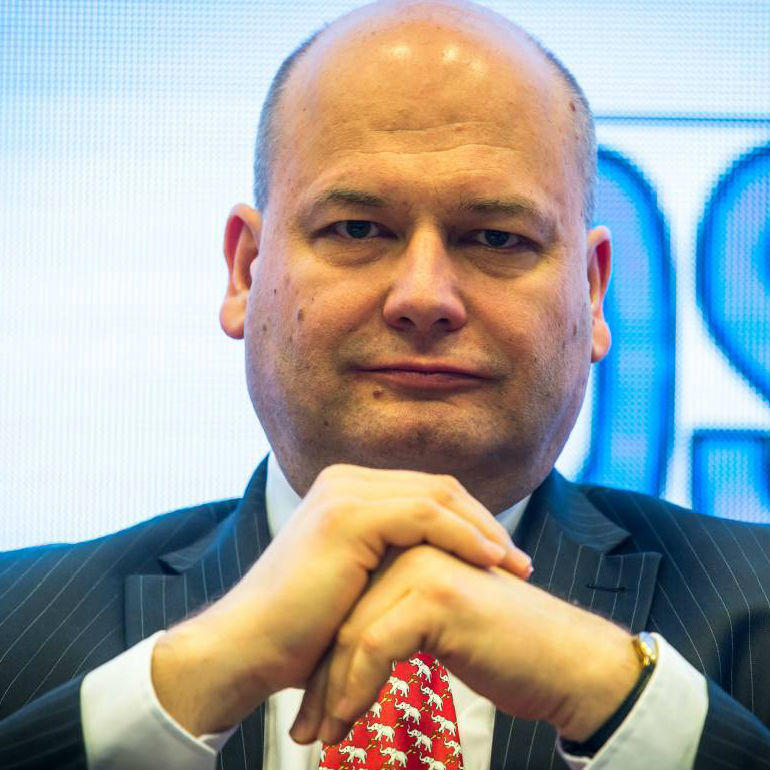Tydzień w gospodarce
Category: Trendy gospodarcze

Witold Słowik, deputy Minister of Economic Development (pic.: PAP)
CE Financial Observer: The Ministry of Economic Development recently presented a list of 47 selected large investment projects which can apply for financing under the so-called Juncker Plan. The goal of this project is to stimulate the economy. On this list there are mainly energy investments. Are large companies simply seizing the opportunity to obtain financing cheaper than from banks?
Witold Słowik: We asked all ministries to submit projects from their subordinate areas. They submitted 108 projects, we verified them and ultimately selected 47 large projects, with a total value of PLN81bn. Two are already being verified by the European Investment Bank.
It is true that 23 projects are from the energy industry and these are needed investments. The participation of companies from this sector in the Juncker Plan and obtaining cheaper financing of investments is not a whim but a necessity for Poland. If we do not invest in our energy sector now, including in the modernization of the transmission networks, then in the future it may turn out that our system will not be able to cover the domestic demand. On the list there are also other interesting projects, including seven related to rail transport, and the construction of a new railway line.
How many projects of private companies are waiting for this financing?
As a ministry we are participating in the process concerning mainly large-scale projects implemented by the state-owned companies. Private companies usually seek the support for smaller investments, and negotiate directly with the EIB or other banks which provide financing under the European Fund for Strategic Investment. We are monitoring these activities and we are ready to assist the entrepreneurs in that process. According to our knowledge one thousand Polish companies have already obtained co-financing up to EUR25m. Their number jumped from 180 to a thousand in just two months. That is a huge increase.
Unfortunately, in the group of large companies that are seeking financing exceeding EUR25m, so far only one private company has obtained the co-financing – a manufacturer of powdered milk. It is not a lot for a country with a population of 39 million.
It is not a lot for now but I have no doubt that there will be more. More and more companies are aware of this source of financing. The statistics of large projects will also improve once the investments from the government list are successively submitted to the EIB. I wouldn’t focus on the number of projects, however, but their quality. The financial support in itself is only a tool, a means to an end. Outside of the one already approved project, the EIB is currently assessing two additional large projects of private companies.
Many people believe that the program would be more popular in Poland if a bigger number of entrepreneurs knew about it. Many, especially smaller companies, are not applying, because they don’t know they can. Maybe we need some kind of a road show promoting the Juncker Plan?
A road show is perhaps too strong a word. In April and May, we have conducted a broad information campaign for all interested parties – local governments, private enterprises and state-owned companies. We talk about the Juncker Plan often, and we promote it all the time. We explain what the program involves, and provide guidance on how to apply for funds. The European Fund for Strategic Investment (EFSI) is not a free EU grant, it is a loan which has to be repaid.
The easy money from EU funds is limiting the need to apply for a loan under the Juncker Plan?
A loan will always appear less attractive compared with a free grant. Its advantage, however, is the amount, the greater acceptance of investment risk and its terms – the time for which it is granted. The upper repayment limit is up to 25 years. Commercial banks generally do not lend for more than 10 years.
How do we compare with the other countries in Europe?
So far, the biggest beneficiaries of the Juncker Plan are: Italy – 33 approved projects, France – 24, Germany – 16, the United Kingdom -15, and Spain – 13. There are also countries where no projects have been yet fully accepted.
Do you feel that there is so much capital on the market that it’s money competing for projects, and not the other way around?
Yes, but those projects still have to be bankable – the revenue must allow the repayment of the loan. On the government list, there are projects which will generate revenues after a very long time, and they will make very little or no profit at all. Examples include water projects, such as the construction of a canal linking the Vistula River with the Oder River. However, their importance for the economy as a whole is enormous.
What other new projects would you like to see within this initiative?
Ones that could stimulate growth. Certainly those which generate high-tech, high-margin, technologically advanced plants, e.g. a drone producing plant, a factory of electric buses, a shipyard producing ships powered by liquefied gas, plants producing rolling stock, companies producing drugs and food with the use of modern technologies.
How to engage private capital to increase investment in Poland?
For example through a wider use of the public-private partnership. We are developing a government policy in this area which will indicate the most important activities for popularizing Public-Private Partnership and identify the existing barriers. Such documents were developed by many countries, for example the United Kingdom, Canada, Australia and Ireland. Today in Poland there are only 101 Public-Private Partnership investments, with a total value of PLN5.5bn, and we are absolutely not satisfied with that result. We want a lot more.
Are there any legal changes required to stimulate PPP?
Some changes will certainly be introduced. In the lower house of Parliament (Sejm) works are underway on the Act on Concession for Construction Works and Services. Investments carried out on the basis of this law are usually PPP projects. The Public Procurement Law is also important for the market. Most barriers, however, are not contained in the laws regulating the PPP but in laws which do not have a direct impact on the conclusion of contracts, but hinder their implementation later on. Therefore, we want to review the entire legislation, in order to find weak points that hamper the implementation of PPP, e.g. tax laws, accounting laws, etc. We have invited more than 50 experts, who will help us in this task.
How to force business and local government to promote PPP which they are afraid of?
We intend to create a list of potential projects to be implemented in the framework of the Public Private Partnership which will be a national database on this type of investments. It will include already verified, initially evaluated projects. We want to break the losing streak of PPP in Poland. On the one hand, we will inform the businesses about what projects are possible. On the other hand, the presence of the projects on the list will be a signal that the Ministry has evaluated them positively.
We are also constantly providing consulting support for specific investments. We have completed recruitment for local government projects intended to be directly supported by the Ministry of Economic Development. There are 35 such projects. We should add to that five medical projects, plus one in Lower Silesia where, together with the Marshall of the Voivodeship, we are preparing Poland’s first program of road maintenance implemented as the Public Private Partnership.
We are also preparing a certain kind of benchmark for Public Private Partnership contracts. The package of changes in the Public Private Partnership legislation will be ready at the turn of the year.
At the same time we have obtained PLN9m from European funds for training and activities supporting PPP. Although in Poland we have been talking about Public Private Partnership for almost 20 years, many people have very limited knowledge on that topic. We will be launching the training programs in the autumn.
Perhaps institutions, which the local governments fear so much that they are refusing any PPP deals, should be trained as well? For example, the Supreme Audit Office or the tax offices. The threat of the fourth „P”, as in „prosecutor”, has been haunting this solution for years.
The training program will also cover the auditing institutions. The list of PPP projects which I have mentioned is also supposed to help in overcoming such fears. I hope that each new implemented investment will pave the way for the next one – also when it comes to the approach of the private sector and the local residents, who often oppose new investments carried out by the local government together with a private company. Meanwhile, in this way we could get schools, hospitals, and even courts or museums on conditions much more favorable for the state.
In Poland only about 20 per cent of commenced talks on PPP investments are concluded successfully. This is due, among other things, to the lack of a model of contracts which creates mutual distrust. In addition sometimes both parties do not know exactly what they want to achieve. We will change the approach, the methods and ultimately also the results in this sector.

